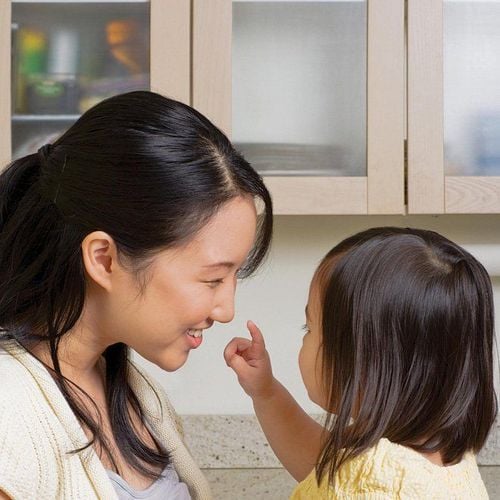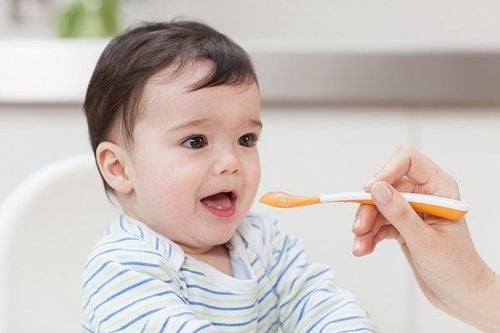This is an automatically translated article.
Before being able to speak in language, children begin by familiarizing themselves with sounds and meaningless words. Babies learn to talk in the first 3 years of life, when the brain is in a period of rapid development. During this time, talking practice is important in developing your baby's speaking ability.1. Children's speech learning journey through stages
After birth, babies cannot talk yet. Babies can only express by gestures such as frowning, crying, twisting to express their physical and emotional needs, from fear and hunger to frustration, sensory overload. Parents can only listen and interpret different cries through body language. The miracle of the child's very rapid language development through the stages is shown as follows:Baby talks at 3 months old: At 3 months old, baby listens to voices, observes faces when you talk together. In addition, babies also pay attention to the sounds and voices from the surrounding environment. Many babies enjoy hearing voices and sounds while in the womb. Some children prefer to hear women's voices more than men's. Baby Talks at 6 Months: At 6 months, babies start babbling to say different sounds. For example, your baby might say "ba-ba" or "da-da." By the end of 6 or 7 months, babies can respond to their own name, recognize their native language, and use voice to express happiness or sadness. Some parents eagerly interpret a familiar string of words like "daddy," while at this age babies can still only babble out random syllables that don't make sense.

Baby talks at 9 months: After 9 months, your baby can understand a few basic words like "no" and "goodbye". Your baby can also begin to use a wider range of consonant sounds and adjust the tone of his voice. Baby Talks at 12 - 18 Months: Most babies can say a few simple words like "mama" and "Dadda" by the end of 12 months. Your child can even respond to or at least understand your short conversations such as “Put it down”. Baby talks at 18 months: Babies at this age are able to say some simple words like saying names of people, objects and parts of your body. Your child may repeat the last words or sounds in a sentence previously heard from you. Baby Talks at 2 Years: By age 2, babies are able to string together a few words in short phrases of 2-4 words, such as "Mom, goodbye" or "Baby, milk". Children are also learning object words like "cup" and abstract words like "mine". Baby Talks at 3: By the time your baby turns 3, her vocabulary is expanding rapidly and she's capable of understanding abstract language like "now", feelings like "sad" and concepts spaces like "in".
Trắc nghiệm: Sự phát triển tinh thần, vận động của bé thế nào là đúng chuẩn?
Khi nào bé biết nói, biết hóng chuyện hay biết cầm cốc là "đúng chuẩn"? Điểm xem bạn biết được bao nhiêu mốc phát triển tinh thần, vận động "đúng chuẩn" của bé nhé!The following content is prepared under supervision of Thạc sĩ, Bác sĩ y khoa, Ma Văn Thấm , Nhi , Phòng khám Đa khoa Quốc tế Vinmec Dương Đông(Phú Quốc)
2. Methods of teaching children to speak
Children often hear and understand what adults say before they can speak. At first, babies can only say a few words, while they can understand 25 or more words. You can help your baby learn to talk if you:Observation: Your baby shows desire through actions such as raising his arms to say he wants to be hugged, giving you a toy to say he wants to play, Move your hand away from the plate of food to show that your child has had enough. Parents should smile, make eye contact, and respond to encourage their child's early attempts at conversation. Listening: Parents should pay attention to the baby's babbling voice and then repeat it correctly for the baby to hear and pronounce accordingly. The baby will try to imitate the parents' voices and change the pitch and timbre to match the words heard. Therefore, parents should spend a lot of time talking with the baby. Praise: You should smile and praise your baby's efforts to talk. Through the motivation that parents bring, the baby will learn to speak faster. Imitation: Babies love to hear their parents' voices. Listening to parents' words helps children develop language skills. When talking to your baby, you should use short, simple but precise words. Details: If your baby points to the table and makes a noise, don't just give him more food. Instead, you should point to the food and say, "Do you want more? You want something different, don't you?" Narrative: Talk about the things involved when you wash the dishes, get dressed, feed, and the changes in your baby's body, such as “I'm going to put on blue socks for you” or “I'm cutting chicken and cooking for you.” eat". This can help your baby hear more. Be patient: Even if you don't understand what your baby is saying, keep trying. Gently repeat what you think your baby is saying and ask if it's true. In addition, you should show love so that your child feels appreciated and keeps trying. Active: During playtime, monitor your baby's attention and interests to see that communication is a two-way game of talk and listen, lead and follow. Play: Encourage children to play, pretend, and imagine out loud to develop verbal skills as they reach toddler age. Read aloud: Children who love to read find reading enjoyable and relaxing.

3. What to do when the child is slow to speak?
Diagnosing children's speech problems early will help them improve their language skills better before they reach school age. Here are a few tests for children with speech delays :Hearing tests : Up to 3 out of 1,000 babies have hearing loss, which can cause speech retardation. Most hospitals require hearing screening soon after birth. Take your baby for a hearing test before 3 months of age if she doesn't pass the initial hearing screening. Speech-Language Pathologists: Speech-language pathologists (SLPs) can diagnose and treat speech and language disorders that delay speech. Helpful tips and games may be suggested in improving the child's speech and language skills. Pathological Screening: Children may be screened for disabilities, developmental or behavioral such as autism spectrum or cognitive disorders. These acquired disorders and diseases can cause speech retardation. Practice talking to your baby: Encourage your baby in the early stages of learning to talk by coaxing, talking, and singing often. While communicating with your baby you should respond positively and show interest. When your child has a speech delay, he or she should be taken to a pediatric psychiatry facility or a psychiatry facility with a pediatric psychiatry specialty. At Vinmec Times City, we have a team of highly trained psychiatrists, including in the field of Pediatric Psychiatry, who will examine, evaluate and guide interventions for children with developmental problems. language.
We will use the Denver scale to assess the child's general development, autism assessment scales (if needed), dental exam, ENT exam, EEG or brain imaging (if needed). needed) to comprehensively assess the child's speech delay in order to provide an appropriate diagnosis and intervention strategy.

For children to be healthy and develop well, it is necessary to have a nutritious diet in terms of quantity and quality balance. If children are not provided with adequate and balanced nutrients, it will lead to diseases of excess or lack of nutrients, which adversely affect the comprehensive development of children in terms of physical, mental and motor skills.
Children who do not eat properly are at risk of micro-mineral deficiency causing anorexia, growth retardation, malabsorption,... If they notice the above signs, parents should supplement their children with products. The supplement contains lysine, essential micro-minerals and vitamins such as zinc, chromium, selenium, and B vitamins to help fully meet the nutritional needs of children. At the same time, these essential vitamins also support digestion, enhance nutrient absorption, help improve anorexia, and help children eat well.
Parents can learn more:
Signs of zinc deficiency in children
Micronutrient deficiency and failure to gain weight in children
Please regularly visit Vinmec.com website and update useful information to take care of your child. Take care of the baby and the whole family.
Reference article source: Webmd.com














